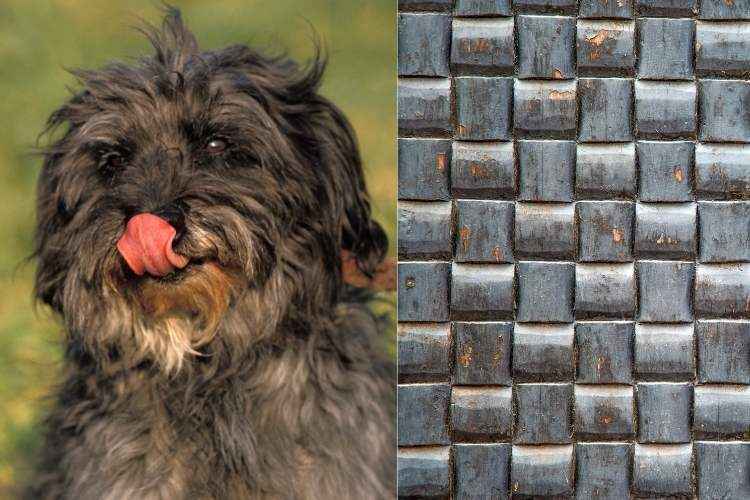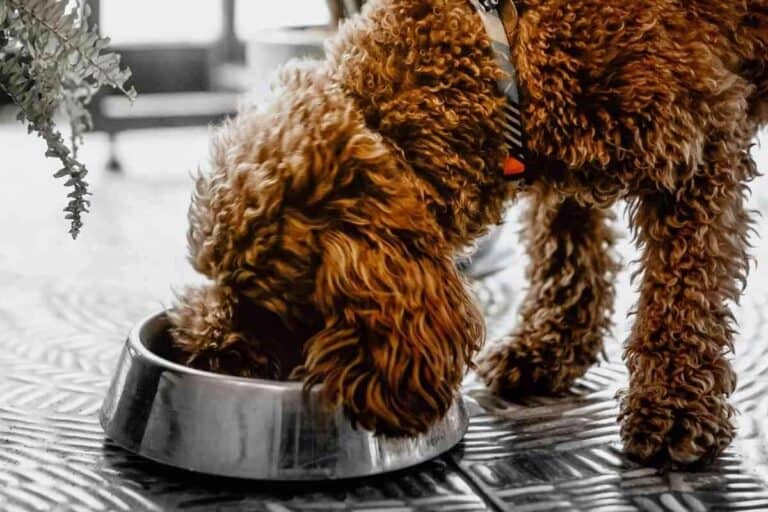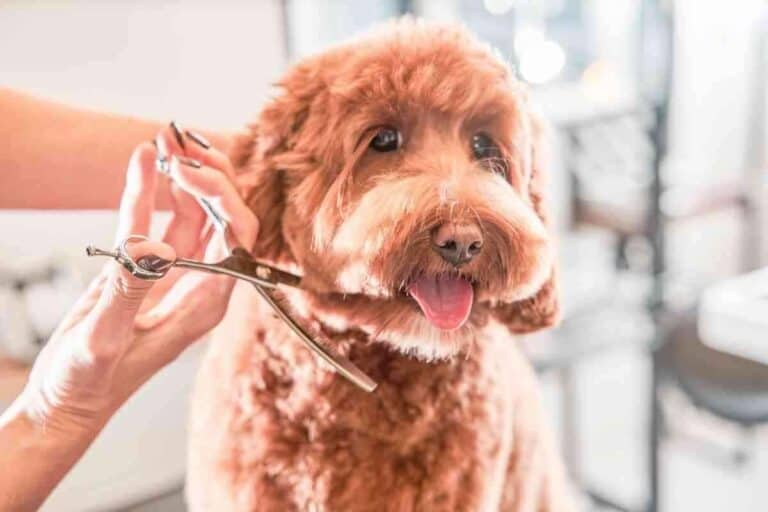When Do Labradoodle Puppies Stop Biting? (How You Can Stop It)
Labradoodle puppies can have sharp teeth even when they are young. This means you need to make sure they stop biting people, especially children. You might be wondering how long their biting phase may last as all puppies bite when they are young. The good news is that Labradoodle puppies often bite when they are playing, they don’t bite viscously or hurt people. Even so, you need to make sure they are not around small children during their biting stages.
Most Labradoodles will stop biting after a few months. They will grow out of the teething phase and be better trained within a few months. Biting behavior should completely end around 14 months if you train them properly and cut bad biting behavior when they are still young.
In this article, you will learn about Labradoodles and their biting habits. Knowing their biting habits will help you become a better dog owner as well as help make sure their teeth are healthy. Dietary problems and development delays may prolong their biting phase.
Why Is My Labradoodle Puppy Biting Me and Other Things?
There are many reasons that can cause your puppy to bite. You need to find a solution to these behaviors right away though or the puppy will continue to bite into adulthood. In order to find the best solution, you need to first find the cause of their biting and go from there.
Even with no solution, the puppy biting will stop around 14 months. However, you might want to deal with the biting promptly, so they don’t damage furniture or hurt people even when they are playing.
Here are some of the most common causes of Labradoodles biting and what you can do to help solve them:
Teething
Teething is what happens when a puppy’s teeth are growing, falling out, or growing back in during adulthood. This stage is unavoidable, and every puppy will go through it. It’s something they need to grow out of, but there are some steps you can take to help the puppy ease some of the pain that comes with teething.
You can give them a frozen treat-filled toy such as the ones from Kong. You can also give them frozen vegetables such as a carrot. Make sure you don’t give them too many treats though or they will begin to get dietary problems. You can even give them regular kibble as the crunch may help soothe teeth and gum pain.
Some Health-Related Reasons
If they are sick, puppies tend to bite more often. If they stopped biting for a long time and now they seem to be back in the habit of biting, check for other symptoms to see if maybe they are feeling sick. If you’re not sure, you can schedule a visit at the vet clinic and ask them for some advice.
If you notice any of these symptoms, you might want to take them to the clinic right away:
- Lethargy
- Whimpering or yelping for no apparent reason
- Refusal to use a limp or liming
- Diarrhea
- Vomiting
Exploring their Senses
Dogs have a keen sense of smell and they want to use it. They want to explore the world with their noses and mouth which may lead them to bite and chew more often. If you think they are chewing and biting because of the need to explore the environment around them, try to give them sensory enrichment toys.
These could include treat reward puzzles, toys with different scents, or special mats for their meals. This will help them to sniff for their food and keep them distracted for longer periods of time.
Over-Excitement
When a puppy sees someone or something new for the first time, it might be over-excited and begin to bite. It doesn’t mean they are being rude; they just want to play and explore the new person. Try to make sure they don’t jump on new people or bite them as this can cause fear in many people, even if your dog is small.
If they are over-excited during the day, you can try to make them calm down by giving them special games or playing with a chew toy. Once you play with them for a long time, they will probably want to rest.
Fear
Dogs can sometimes become fearful just like humans and other animals. Major fear periods for Labradoodles are when they are eight to 11 weeks and six to 14 months old. During this time, you might see the puppy growling, snarling, barking, biting, aggression, and nipping.
During these periods, make sure you are showing them patience rather than anger and aggression back. You also need to make sure their training is very consistent and that you don’t give up even when times get hard.
If you think your dog is being fearful they might also exhibit some of these other behaviors including:
- Flattened ears
- Avoiding eye contact
- Shaking/trembling
- Whites of eyes showing
- Licking their lips often
- Trying to hide in corners or under furniture
- Flattened ears
If they bite after showing one of these behaviors, you can be sure they bite out of fear. Try to be patient and calm them down. You might also just want to leave them alone for a while until they come back to you.
Many things can make Labradoodles fearful during this time. It doesn’t mean you did something wrong or acted in a way that made them scared. They might also be scared by loud noises or unusual activity around the house.
Play and Socialization
Many puppies bite when they are playing. This is normal and doesn’t mean they want to hurt you. However, they can accidentally hurt you because their teeth are so sharp even when they are just three weeks old.
How they were socialized as puppies will also depend on how they bite during play. Puppies will often bite each other and their mother to keep from being isolated from the group.
If you found a puppy or were given a puppy too early, they might not have received the socialization skills they needed early in life. This can cause them to bite more often and harder. Just make sure you redirect their biting behavior to toys and food so they don’t injure you.
How Can I Stop Puppy Biting?
One of the best ways to reduce puppy biting is to use the click and command approach. If you don’t have a clicker, you can use treats and rewards. Clickers can often be more useful though as your dog learns the noise and it will make sure they are not receiving too much food throughout the day.
Whatever method you use though, be consistent. Stick to one method and ensure your dog becomes used to it. Frequent changes can confuse the dog and make it harder for them to learn.
You should also ignore biting. Simply redirect it to a toy or put them in their crate until they calm down. Never hit them on the mouth or anywhere. This method usually doesn’t work when it comes to bite training.
Should I Punish My Puppy When They are Biting?
Many vets and animal experts say that punishment can actually have adverse effects on training. This means they might still continue to bite if you punish them or they will simply ignore the punishment. Even worse, they might become afraid of you and then it will be very hard to train them.
You also don’t want to punish them if they are biting or growling because of fear. You want your dog to express their feelings. You also want them to continue to bite and growl if there is an intruder in your home or someone unwelcome.
How Do I Know if My Puppy is Biting Aggressively?
Most of the time, your puppy will not be biting out of aggression unless they have learned the habit from somewhere. If they are being aggressive, they will also show other signs such as:
- Growling if you approach them
- Guarding an object or growling when someone tries to take the object
- Running or hiding with the object
This means they have become possessive over the toy. This is never a good sign. Make sure your dog doesn’t guard toys, food, food bowls, or even people.
Usually, this kind of behavior needs a behaviorist. You can consult your vet about the behavior and ask for recommendations on a good behaviorist that can help. You don’t want to let this behavior go on for too long as it will cause more aggression and bad habits in the future.
Final Thoughts
In general, puppy biting in Labradoodles should stop around 14 months. Until then, you can use chew toys and bones to redirect biting. You can also do clicker training and crate training to show them what is appropriate and what isn’t. Always be patient with training and allow them to have space to grow and play.






